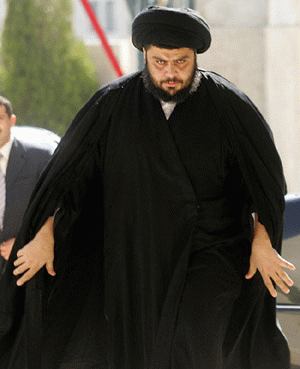
Muqtada al-Sadr: Could it be
that Iran
is behind his recent embrace of
peace?
Dar al-Hayat, Lebanon
The
'Awakening' of
Muqtada
al-Sadr:
What is
Iran's Role?
"Who would have imagined at
the beginning of the American invasion of Iraq five years ago, that the
decisions of Muqtada al-Sadr and the Al-Mahdi Army he leads would be the
subject of praise by American forces? … It's unlikely that al-Sadr was angling
for American praise, since it damages his status among his supporters."
By Elias Harfouche
February 24, 2008
Lebanon
- Dar al-Hayat - Original Article - (English)
Who would have imagined at
the beginning of the American invasion of Iraq five years ago, that the
decisions of Muqtada al-Sadr and the Al-Mahdi Army he leads would be the
subject of praise by American forces, which once described him as "the
most dangerous man in Iraq?" Indeed who would have imagined that this
young leader, once held responsible for the bloodiest sectarian aggressions,
would be transformed into the Shiite figure embodying the hope of preventing
sectarian disintegration?
The Mahdi Army was among the
leading forces confronting the Americans in Iraq. These confrontations,
however, turned into a confessional war against Sunnis in Baghdad and
elsewhere. It wasn't long before Sunni groups began to respond in kind with
"cleansings" that encompassed Shiite areas. After all, it is
well-known that sectarian war begets more sectarian war.
Thus, expulsion became a
"national" trend that included all sides. The struggle then shifted
to the Shiite sect itself, and took the form of a struggle between followers of
al-Sadr and the Supreme Islamic Council led by Abd al-Aziz al-Hakim. Last
summer's Karbala War between the factions was the turning point that persuaded top
Shiite cleric Sayyid Ali Sistani to induce Muqtada al-Sadr to call the truce and
bring the undisciplined elements of his army under control.
From the other side
of this divide, the inter-Sunni struggle was also expanding. While the
confrontation had once focused on American forces, inside what was once known
as the "Sunni triangle" from Baghdad to the governates of Anbar and
Salah al-Din, the killings began to claim Iraqis in a war of leaderships and
clan struggle, which demonstrated the difficulty of creating cohesion in this
region in terms of tribal solidarity and allegiance. But these internal
struggles facilitated the American penetration of the region, especially with
the emergence of the Councils of Awakening, America's most important
accomplishment in their war against Iraqi resistance factions wearing the Sunni
cloak.
One could describe Muqtada
al-Sadr's decision as a kind of awakening similar to the Sunni awakening. In
the letter that was read in his name at mosques following Friday prayers last
week WATCH  , Al-Sadr acknowledged his awakening to the poor
morale in his army and the importance of preventing disputes among Iraqis.
, Al-Sadr acknowledged his awakening to the poor
morale in his army and the importance of preventing disputes among Iraqis.
Al-Sadr said: "I cannot
assume the sins of the rebellious, or the crime of the criminals, or the
shortcomings of the negligent. Whoever sees in himself the will and the
determination and the strength to distance him from Satan, let him be a student
of the [Mahdi] Army and become one of its members. O God! Do not make me one
who does harm to the Muslims, and do not make me one who makes dissension, O
God! Make me one who calls for a dialogue of the religions." Can an
"awakening" be any deeper than this?
The American command in Iraq
praised al-Sadr's latest decision, commenting that it contributes to better
security for Iraqis. The Americans also considered the truce an opportunity for
national reconciliation that will enable U.S. and Iraqi forces to remain
focused on the terrorists of al-Qaeda. It's unlikely that al-Sadr was angling
for such praise, since it damages his status among his supporters. Some
partisans even expressed reservations about his decision to uphold the truce,
arguing that it prevents them from achieving their political objectives and
didn't serve their interests, especially since they remain out of the
government. But allegiance to al-Sadr and the religious position of his family
render any such objections meaningless.
Iran's position toward
al-Sadr's decision and its influence over him remain to be seen, especially
given the intimacy of Iran's relations with the Supreme Council for the Islamic
Revolution in Iraq  and the al-Hakim
and the al-Hakim  clan, al-Sadr's traditional Shiite adversaries.
clan, al-Sadr's traditional Shiite adversaries.
Posted by WORLDMEETS.US
After the announcement of the
first truce last year, it was said that al-Sadr headed to the Iranian city of
Qum to pursue religious studies and seek protection from the Iranian
leadership, fearing for his safety in Iraq. It's more likely that the Iranian
project in Iraq, like the rest of its projects in the region, leaves very
little room for sectarian divisions of the type that seemed to be developing in
Iraq. This may explain al-Sadr's "awakening" and his belatedly seeing
reason!
[Posted by WORLDMEETS.US February 27, 1:40am]